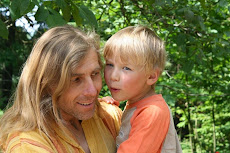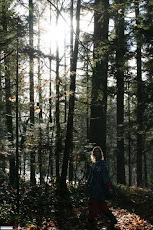"Hi Rick. I'm a reporter with The Globe and Mail, and an author I'm interviewing suggested I contact you. Her name is Shannon Hayes, author of Radical Homemakers: Reclaiming Domesticity from a Consumer Culture. She mentioned she follows your blog and considers your lifestyle, like hers, "radical homemaking," that is, requiring less income to live a more ecologically balanced and fulfilling life. I'd love to speak with you about your decision to become a stay-at-home dad and rural farmer."
Well, that got my attention. Guess when I claimed to be a radical homemaker a few weeks back, someone took me seriously. But during the interview, it was a challenge to represent the ideals that I and apparently a growing movement of people are aspiring to. I waxed eloquent on food production, slow economy, and connected community. But there's so much more to it than I managed to express on the fly on the phone. So, Globe and Mail, here's what I wished I'd said:
We didn't "join" this "movement" when we moved rural. We moved towards it when we started to prefer the Utne Reader to Readers Digest, and became part of it when we made our first radical values-based behavior change. It had nothing to do with food or social justice or the environment; in our case it was transport. Sarah and I decided to stop using the major freeway that blasted through the middle of town. A ferociously dangerous, bi-level, multi-lane beast that divided the city along ethic and economic lines, suddenly didn't feel like a healthy part of our lives. We could afford to spend an extra 5 traveling minutes to slow down on smaller city streets that allowed us to see people, stop by small stores, travel more safely, breathe a little easier and let our hearts and wheels race a bit slower. Just like that, one little piece of our lives was more in alignment with our wedding vow to "live simply."
After conquering the interstate (via boycot), we moved on to the next goliath: foresaking chain restaurants in favour of ma&pa greasy diners. Better to support local ownership, more character in the food and clientelle, more sense of discovery. Nothing yet about organic, just quality in our lives, investing our money where it would do greater good, enjoyment, connection.
Layer after layer has peeled away in the intervening years. Awareness of what we believe in slowly and beautifully seeps into choices around transport, careers, religion, child-rearing philosophy and schooling, local food, organics, recycling, reusable toilet paper, politics, charitable donations, toys, giving up wireless, exercise, sleep patterns, clothing, treats, toothpaste, travel (air vs. train vs. none), videos, facebook frequency. The list is as endless as the number of things we do or don't do, consume or don't consume, touch or are touched by. Each and every experience of each and every day adds up to the sum of how we are living out our faith. This level of intentionality used to be exhausting; now it's the biofuel that drives us.
So please, Globe and Mail, don't reduce this to an article about homesteading. There are people all around making brave and original choices. They're not all rural farmers, not all long-haired Waldorfian liberals, and certainly not all as brazenly public as I've chosen to be. The idea of radical homemaking is so much more than where we live or what we eat - it's how we try each moment to live with integrity, how we can look ourselves and our neighbours and our as-yet-unborn great grandchildren in the eye and say that we are doing our best to live up to what we believe to be a Right and Fair and Sustainable and Joyful way for us all to share this world.






No comments:
Post a Comment